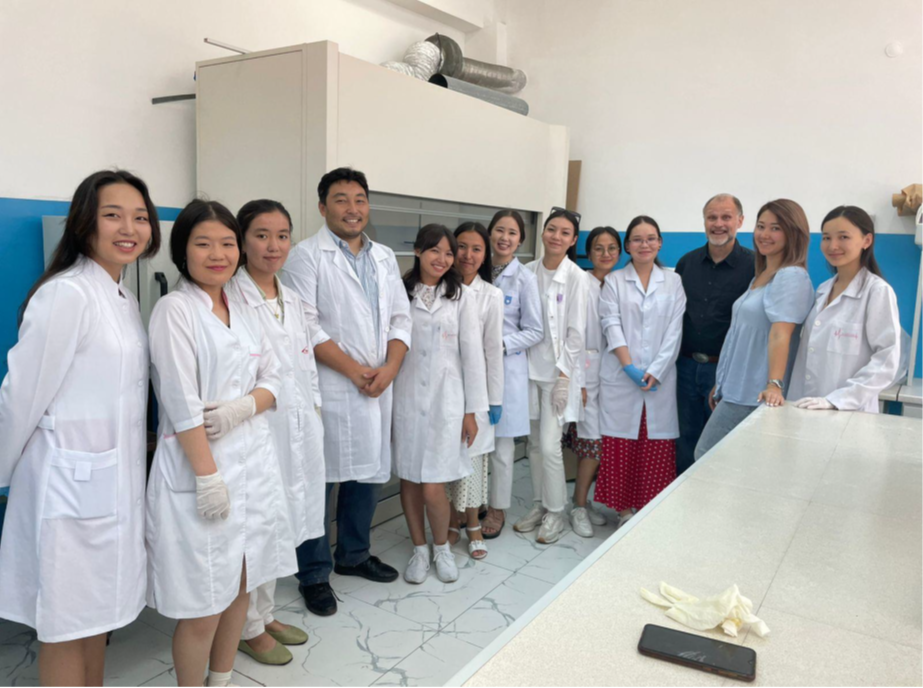“My work in Kazakhstan has demonstrated to me that there are huge opportunities for science and engineering training.” – Daniel Snow, Director of Water Sciences Laboratory, University of Nebraska Lincoln
Lake Bylkyldak in northeastern Kazakhstan is a poster child for the country’s environmental challenges. Lined with industrial mercury, the most toxic heavy metal in the environment, Bylkyldak illustrates the difficulty of environmental clean-up in the country. Proper site assessment is the first step to remediation and treatment, but the country lacks the skilled workforce to do it. There is an urgent need for scientists and engineers with strong backgrounds in biology, chemistry, and geology who have skills in GIS, map preparation, Peld and lab work, and who keep up with the constantly changing treatment technologies. Few, if any, Kazakhstani universities have strong environmental science programs, so environmental companies often resort to hiring employees from other countries.
In the project “Science with a Purpose: Improving Environmental Science in Kazakhstani Universities,” team members used Bylkyldak as a classroom laboratory for a hands-on short course. Over an intensive course, Kazakhstani students collected water samples from wells, rivers and wastewater effluents. They learned how to test for mercury and different methods for mercury removal. They prepared adsorbents from three different kinds of the natural clays of region, measuring their efficacy.
The project was a partnership between the University of Nebraska-Lincoln and three Kazakstani universities: M. Kh. Dulaty University in Taraz, the Innovative University of Eurasia in Pavlodar, and Al-Farabi Kazakh National University in Almaty. It was funded by a grant awarded through the U.S-Kazakhstan University Partnerships Program, administered by American Councils for International Education and funded by the US Department of State through the US Embassy in Kazakhstan.
THE POTENTIAL OF SHORT COURSES FOR CAPACITY DEVELOPMENT
The team started by working with faculty at each of the three Kazakhstani universities to assess the existing environmental studies curriculum, with an eye toward developing an environmental science graduate program at these institutions. They developed a prospective list of new courses to help modernize curriculum, with particular attention to related to treatment, remediation (cleaning) and modern methods for measuring pollutants.
They then trialed three short courses, each emphasizing hands-on experience and action learning, as an approach to environmental training. The course led by Dr. Marzhan Kalmakhanova of M. Kh. Dulaty Taraz Regional University, was one. Dr. Daniel Snow of University of Nebraska-Lincoln led a course on air quality, in Almaty, where students practiced cleaning the air by photocatalysis. And he also taught a skills-based course on research and science writing, to strengthen the research capacity of graduate students in science and engineering. Students learned how to write scientific papers and submit them to journals, setting them up for future opportunities as researchers.
“Environmental science is particularly challenging because it is interdisciplinary,” the team pointed out in their final presentation. “These courses develop analytic thinking, explore analytic approaches, enhance writing skills, and help students gain experience in oral communication about environmental issues.”
The courses were inspiring to the students. “My students were very motivated after these projects and they wanted to make other projects,” noted Kalmakhanova. “They started learning science and they wanted to work in laboratories.”
Students who could not attend are able to access all the materials online and active until December, including lectures and short tests to monitor their knowledge. And the courses now belong to the partner Kazakhstani institutions, for the universities to embed in their curriculums.
In all, the project involved 20 faculty members and 15 students from three universities in Kazakhstan. Three scientific papers on water quality have been published, and the students now have the skill set
A NEW GENERATION OF SCIENTISTS
The project’s work will continue. The team has leveraged their work on this project into funding that will keep the collaboration growing into the future. Snow and Kalmakhanova plan to coadvise PhD students at both universities. And they are preparing a publication on the potential of short courses. “We would like to think that these short courses will be additions to environmental studies courses for university curriculum in Kazakhstan,” says Snow, “and that they will strengthen student competencies in designing research projects, collecting data, providing public presentations, and preparing scientific papers.”
Most importantly, the project has both trained and inspired a new generation of scientists. “Now my students have the experience that they took from this course, they are helping with my new project,” explains Kalmakhanova. “It’s good for me and for the students too.” And it will be good for Lake Bylkyldak and other environmental challenges, as these students graduate into the green workforce of the future.
About the program:
The U.S.-Kazakhstan University Partnerships Program builds capacity for substantive international engagement between higher education institutions in the United States and Kazakhstan. It facilitates partnerships that modernize curricula and enhance teaching capacity in STEM fields, increase research capacity –particularly in the areas of renewable energy, environmental sciences and air quality — and enhance institutional capacity for internationalization.
About the University Partners:
University of Nebraska-Lincoln is the flagship public research university in Nebraska with approximately 20,000 undergraduate students. Its Water Sciences Laboratory works to create new analytic methods for emerging environmental contaminants.
Al Farabi Kazakh National University in Almaty is one of Kazakhstan’s premier institutions.
M. Kh. Dulaty Taraz Regional University is the largest and oldest university in Kazakhstan’s southern region, with approximately 10,000 students.
Innovative University of Eurasia in Pavlodar is a multidisciplinary university, with approximately 7,000 students. It offers 57 programs in subjects such as engineering, natural sciences, law and economics.
